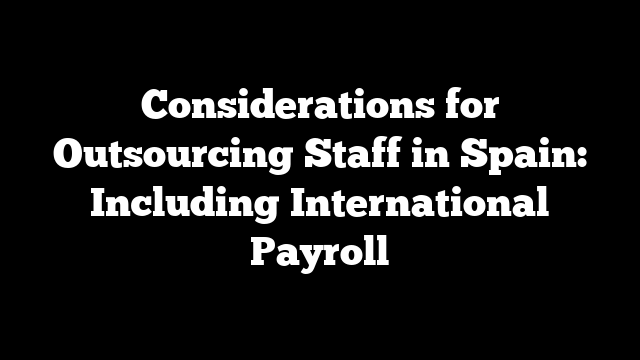Outsourcing has become a strategic option for businesses aiming to optimize operations, reduce costs, and tap into specialized expertise. When considering outsourcing staff in Spain, understanding the local landscape, regulatory framework, and cultural dynamics is crucial for a successful partnership. Here’s a comprehensive guide to navigating outsourcing in Spain, including considerations for international payroll management:
Understanding the Outsourcing Landscape in Spain
Spain has emerged as a competitive destination for outsourcing services, driven by a skilled workforce, advanced technological infrastructure, and a favorable business environment. The outsourcing industry in Spain spans various sectors such as IT services, customer support, finance, and manufacturing, offering tailored solutions to meet global business needs.
Regulatory and Legal Considerations
- Employment Law: Spain upholds robust employment laws safeguarding workers’ rights, encompassing working hours, holidays, and termination procedures. Compliance with Spanish labor regulations is essential when outsourcing staff to mitigate legal risks and maintain positive employer-employee relations.
- Data Protection: Adherence to the General Data Protection Regulation (GDPR) is mandatory for outsourcing involving personal data. Contracts should include provisions ensuring data security and GDPR compliance to protect sensitive information.
- Contractual Agreements: Clear contractual agreements with outsourcing partners are crucial. These agreements should outline responsibilities, deliverables, service-level agreements (SLAs), and dispute resolution mechanisms. Legal expertise can help draft contracts aligned with Spanish laws to safeguard business interests.
Cultural and Operational Dynamics
- Language and Communication: While Spanish is the official language, many professionals in urban areas are proficient in English, easing communication barriers in international business interactions.
- Business Etiquette: Understanding Spanish business etiquette, such as the importance of building personal relationships and respecting hierarchy, fosters effective collaboration with outsourced teams. Networking and social interactions are pivotal in establishing trust and productive partnerships.
Financial Considerations, Including International Payroll
- Cost Efficiency: Outsourcing to Spain offers cost advantages compared to Western European countries, with competitive labor costs and quality service delivery. Evaluating cost structures, including taxes and overheads, determines potential savings and ROI.
- Currency Management: Monitoring currency fluctuations is critical as they impact outsourcing costs and financial planning. Strategies like hedging agreements in euros mitigate exchange rate risks, ensuring financial stability.
Strategic Outsourcing Benefits
- Access to Talent: Spain boasts a skilled and multilingual workforce, providing access to specialized talent pools for diverse business needs.
- Operational Flexibility: Outsourcing enables businesses to scale operations swiftly, respond to market dynamics, and focus on core competencies while outsourcing non-core functions.
Conclusion
Outsourcing staff in Spain presents opportunities to leverage skilled labor, technological infrastructure, and a conducive business environment. By navigating regulatory compliance, understanding cultural dynamics, and managing international payroll effectively, businesses can establish successful outsourcing partnerships that drive efficiency, innovation, and growth in a competitive global market. Understanding these considerations is crucial for making informed decisions and maximizing the benefits of outsourcing in Spain.



